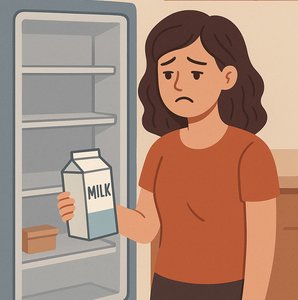| Phrasal verb | Main meaning |
|---|---|
be out of [biː aʊt əv] | to have no more of something |
Other meanings
- to be not involved or no longer participating in something
- to have left or exited a place or situation
- to be unavailable or away temporarily
Example Sentences Using the Phrasal Verb "be out of"
- We are out of milk.
- She is out of the project now.
- He was out of the office all morning.
- They are out of the competition.
- I am out of ideas.
Features of Using "be out of"
Commonly used when something has run out or is no longer available (like supplies or resources). It also can refer to absence from a place or withdrawal from participation. The meaning depends on the context — physical absence, depletion, or ending of involvement.
Other phrasal verbs with the verb be
be back
to have returned to a place
be away
to be absent or not at home
be in
to be at home or in a particular place
be against
to oppose or disagree with someone or something
be on
to take place
be over
to have finished
be behind
to be late or delayed
be for
to support or favor something
be out
to be absent or not at home
be into
to be interested in or enthusiastic about something or someone
be about to
to be on the point of doing something (imminent future)
be down
to not be working or functioning
be up
to be awake; not sleeping
be after
to try to obtain or pursue someone or something
be off
to leave or depart
be with
to support or agree with someone
be along
to arrive soon
be through
to have finished something
be up to
to be doing something (often secretly or mischievously)
🔗 Learn more about the irregular verb be, including its forms and usage.




















